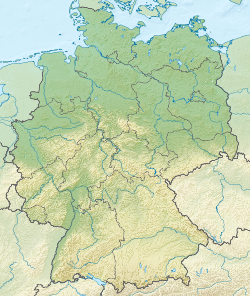The Exter Formation is the only formation of the Upper Keuper or Rhätsandstein, and is a geologic formation in Germany. It preserves fossils dating back to the Rhaetian of the Triassic period (specifically around 205 Ma).[1][2]
| Exter Formation | |
|---|---|
| Stratigraphic range: Rhaetian ~ | |
 Exter Formation at Krauthausen | |
| Type | Formation |
| Unit of | Keuper |
| Sub-units | Rinteln, Oeynhausen & Vahlbruch Subformations |
| Underlies | Black Jurassic |
| Overlies | Arnstadt & Trossingen Formations |
| Thickness | Typically between 100 and 150 m (330 and 490 ft) Locally 250 m (820 ft) in northern Germany Up to 45 m (148 ft) in southern Germany |
| Lithology | |
| Primary | Claystone, siltstone, sandstone |
| Other | Coal |
| Location | |
| Coordinates | 48°36′N 9°06′E / 48.6°N 9.1°E |
| Approximate paleocoordinates | 36°06′N 10°48′E / 36.1°N 10.8°E |
| Region | Niedersachsen, Baden-Württemberg, Westphalia, Bavaria |
| Country | |
| Extent | Widespread |
Fossil content
editThe formation has provided fossils of:[1][2]
Mammals
editTherapsids
editReptiles
editFish
editInsects
editFlora
editSee also
editReferences
edit- ^ a b Exter Formation at Fossilworks.org
- ^ a b Rhätkeuper at Fossilworks.org
- ^ Wintrich et al., 2017
- ^ Fraas, 1897
- ^ Bapth et al., 2013
- ^ Van Konijnenburg-van Cittert et al., 2021
Bibliography
edit- Van Konijnenburg-van Cittert, J. H. A.; Pott, C.; Schmeißner, S.; Dütsch, G.; Kustatscher, E. (2021), "The Rhaetian flora of Wüstenwelsberg, Bavaria, Germany: Description of selected gymnosperms (Ginkgoales, Cycadales, Coniferales) together with an ecological assessment of the locally prevailing vegetation", Review of Palaeobotany and Palynology, 288 (Article 104398), Bibcode:2021RPaPa.28804398V, doi:10.1016/j.revpalbo.2021.104398
- Wintrich, T.; Hayashi, S.; Houssaye, A.; Nakajima, Y.; Sander, P. M. (2017), "A Triassic plesiosaurian skeleton and bone histology inform on evolution of a unique body plan", Science Advances, 3 (12): e1701144, Bibcode:2017SciA....3E1144W, doi:10.1126/sciadv.1701144, PMC 5729018, PMID 29242826
- Barth, G.; Nel, A.; Franz, M. (2013), "Two new odonate-like insect wings from the latest Norian of northern Germany", Polish Journal of Entomology, 82 (3): 127–142, doi:10.2478/v10200-012-0029-4
- v. Huene, F (1940), Fossilium Catalogus. I: Animalia. Pars 93: Mammalia Triadica, F. Quenstedt (ed.), pp. 1–13
- Hennig, E (1922), "Die Säugerzähne des württembergischen Rhät-Lias-Bonebeds", Neues Jahrbuch für Mineralogie, Geologie und Paläontologie, 46: 181–267
- Fraas, E (1897), "Reste von Zanclodon aus dem oberen Keuper vom Langenberge bei Wolfenbüttel - Remains of Zanclodon from the upper Keuper of Langenberge near Wolfenbüttel", Zeitschrift der Deutschen Geologischen Gesellschaft, 49: 482–485
- Plieninger, W. H (1847), "Zahne aus der oberen Grenzbreccie des Keupers bei Degerloch und Steinenbronn", Jahreshefte des Vereins für Vaterländische Naturkunde in Württemberg, 3: 164–167
